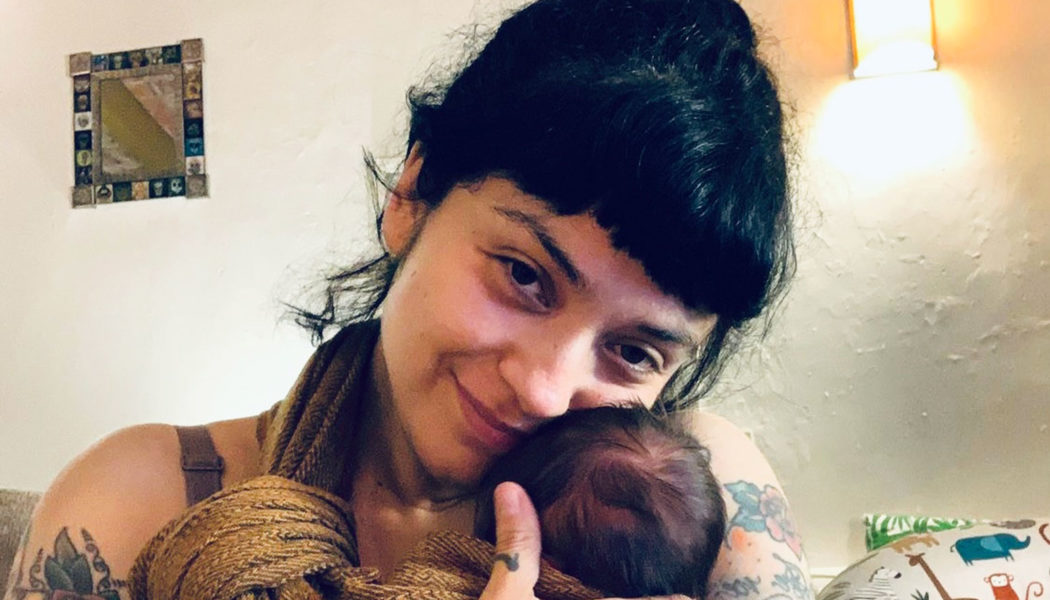Chilean singer Mon Laferte made quite a stir at the Latin Grammys last year when she walked the red carpet and then performed in belly-baring outfits that proudly displayed her baby bump. At the time, Laferte was nearly seven months pregnant, in the middle of her U.S. tour and making it all look so easy. Except it wasn’t.
“I always saw pregnant women going to work and thought, ‘Oh how cute. It must be so easy.’ But now that I lived it, it’s exhausting,” says Laferte — who, unbeknownst to most people, was bedridden for a chunk of her tour, getting up only to perform. “Your back hurts, your feet get swollen – I went up a whole shoe size. It’s physically and emotionally complicated. All my concentration was placed on the baby and the pregnancy, but I also had to make the decisions that are part of a performance career.”
Those decisions continued through her recent trip to the Grammy Awards, traveling to Vegas — this time with her 3-month-old baby in tow, as well as diaper bag, breast pump, wipes and bottle heater.
She’s hardly alone. Indie publicist Jennifer Nieman (Maluma, Prince Royce) traveled with daughter Tatiana, now 15, to every single business trip during her first year of life, with her mom or babysitter along to help.

This month, her fellow publicist and manager Sarah Duru (María Becerra, Mau y Ricky) is doing the same with her newborn, traveling to Vegas for the Latin AMAs on April 21 with her mother-in-law and staying at an Airbnb to facilitate breast feeding and childcare.
“We do the impossible to balance it all,” says Nieman, a single mom, her voice breaking.
But no one talks about it.
In panels, industry gatherings, podcasts and media interviews, women are vocal about subjects like representation, equality, singing empowering lyrics and celebrating their sexuality. But by comparison, conversations about what to do when you have to leave the recording session because the baby needs a bottle or your kid needs help with homework are not a thing.
“There is so much pressure,” says Nieman. “There is a lot of pressure to be there for everyone at all times. This is not necessarily expressed by clients and may be self-imposed. But I never turn my phone off, even at night. My daughter used to tell me, ‘Mami, you know you can turn [the phone] off, right?’ And I would say, ‘No, I really can’t.’”
Balancing career and motherhood doesn’t end with pregnancy, of course, but continues to crescendo until children become adults. And while one can’t say that the balance is more difficult for mothers in the music industry, the particularities of the music biz — its round-the-clock cycle, unpredictable hours and image-facing jobs, even for executives — bring particular challenges that are largely kept silent.
My daughter used to tell me, ‘Mami, you know you can turn [the phone] off, right?’ And I would say, ‘No, I really can’t.’”
Maria Fernández, COO and executive VP of Sony Music Latin Iberia, remembers more than once taking the red-eye from Las Vegas to Miami to make her children’s Thanksgiving school recital, which often took place the same week. Then, unbeknownst to most, she’d fly right back to make it to the Latin Grammys afterparty, an important industry event. No one suspected she had ever left.
“It’s a complex balance because so many activities take place outside working hours,” she says.
And of course, even the best-laid plans can go awry. “You can plan as much as you want, but you need to adapt to the twists and turns of everyday life, otherwise, you can get easily frustrated,” says Alex Flores, BMI’s SVP of creative and mother of 7-year-old twins. “There have been times when I’ve been late for a school appointment or pickups, and I remind myself that I am doing the best I can, and that’s all I can do.”
“Sometimes I feel there’s this unspoken rule of, women have to take it all on, and we have to pretend that it’s easy, and it’s not. And we don’t want to admit to each other that it’s hard,” adds Alessandra Alarcón, president of SBS Entertainment and mother of two children, 5 and 3. Asking for help when needed is crucial, says Alarcón. But what happens when there’s no one to ask?
In my early months as a pop music critic at the Miami Herald when I was a young mom in 2000, I was unable to go cover a reggae festival on a Sunday because my babysitter didn’t show up and I couldn’t find a last-minute replacement. (My husband, a recording artist, would perform most nights.) When I called my female boss to let her know, fully expecting her to sympathize, she reprimanded me for “not having a backup plan.” I’d been in town all of three months and went into a panic. Was my job in jeopardy because I didn’t have a battalion of babysitters at my disposal? I had been hired when pregnant, so that only heightened my insecurity.
It became one of several incidents where I felt motherhood challenges ran afoul of unspoken company policy or newsroom culture. A plum overseas assignment was given to someone else while I dropped my daughter off at childcare; I wasn’t offered maternity parking close to the entrance because I wasn’t eligible until I spent six months on the job.
My solution was – and still is — to always over-deliver. Figuring out what to do with the children, meantime, was entirely my problem.

When Luana Pagani worked as a marketing executive at Sony Music in the late 1990s, being a young mother of two was never frowned upon. But she went to great lengths to ensure that didn’t happen.
“It was a given: I was a mother,” says Pagani, who today is the president of management firm Seitrack U.S. “But in all fairness, I wasn’t the sort of person that if my babies were a little sick, I’d skip work. It was what it was. I needed the job and my nature is to work hard. But I never felt discriminated [against] as a mother or as a woman.”
She was lucky. “Now that I work in the independent world with people of all stripes and I see what others go through, I feel like I lived in a world that wasn’t the real world,” she says.
But the definition of the “real world” changed with COVID. Suddenly, everyone was working from home. Suddenly, every worker in the planet was doing Zoom calls with their children in the background. Suddenly, parenthood wasn’t invisible.
“People are way more open, especially men,” says Alarcón. “They’re much more open to bringing a baby to the office. I felt there was going to be a lot more judgment [when we returned to the office], and there wasn’t. And we’re working a lot from home, so families are much more prominent. Before, it was, ‘Keep your family at home, don’t use them as an excuse.’ Now, there’s a respect of boundaries. When people call me at 7:00 p.m., I say, ‘Hey, I got kids.’”
Fernández – who is the mother of an 11-year-old boy and 8-year-old girl — works closely with Sony’s human resources team and sees COVID as a catalyst for major change in the workplace that goes beyond simply being more flexible, and that also considers workers of all levels and departments.

Among other things, she says, fathers – and not only mothers — also have to be taken into consideration.
“In some places, paternity leave is frowned upon,” she says. “So fathers who do want to have an active role in raising their children confront this paradigm that is ‘justified’ for women. What recommendations can we give companies so they are more inclusive and which help different groups, like fathers and mothers?”
Fernández says Sony Latin is embracing a working model that is “hybrid with flexibility,” where time is shared between home and office and where efforts are made to accommodate individual needs and schedules.
There are roles, however, that aren’t flexible. Those who work in A&R or other more creative jobs often find that children or not, they may find themselves at a recording studio at 4:00 in the morning. Award-winning singer-songwriter Erika Vidrio is a mother to a 15-year-old girl, and during the pandemic, she and her wife had a son, now 2 years old, who she says is “a hurricane.”
In order to escape the “hurricane” and get into her creative mode, Vidrio built a studio next to her home, to which her son has no access. “I used to have the studio inside my house, but working with him is impossible. I need silence, and I need to be shut out, because the moment I hear my son’s voice, I go to him,” she laughs.
More important, however, is her wife’s support, especially when she travels to song camps or awards shows. “In music, if you don’t have a partner that helps you work things out, it’s very difficult,” she says.
In Laferte’s case, her partner is her production manager, and as such, her permanent companion with the baby, both at home and on the road; he’s on diaper and bath duty, and Laferte nurses.
You can’t work and be a professional and be a mom if you go in judging yourself.
If there is no partner or family around, having a support system, whether a nanny, housekeeper, neighbor — anything — is key. Absent my family, I routinely went to press conferences with a baby in the stroller and had no qualms about asking someone in attendance to hold her if needed (shout-out to Warner Music’s Delia Orjuela, whose mom once watched my baby in a venue lobby in Los Angeles while I reviewed a show). Neighbors were godsends.
“If someone says, ‘I can watch the baby for two hours,’ say yes!” says Alarcón. “As women, we sometimes feel we can’t accept that help, but we can.”
It’s not just about asking for help, but also helping yourself. “To take care of others, you must take care of yourself and make yourself a priority,” says Flores. “I try to do at least a couple of things a week that are just for me. It’s important to do things that make you feel good, relax and center you.”
And at the end of the day, be aware that, yes, something will give and something will be sacrificed. And that’s OK. “You can’t work and be a professional and be a mom if you go in judging yourself. That’s the killer,” says Alarcón. “I’ve learned to be kinder to myself.”
Nieman remembers a night at the Latin Grammys red carpet where she was dealing with a client’s ticket while her daughter called nonstop.
“I finally picked up and snapped: ‘I can’t talk right now!’ And she answered in her sweetest voice, ‘Mami, I got first place in the spelling bee!’ I was stressed over something that wasn’t even part of my job when she called to share her special news. It was an eye-opening moment.”
Beyond the practicalities of balancing and time management, being a mom can have profound effects on a profession. “I began to worry about what I said in my songs,” says Vidrio. “I want my children to listen to my songs, so I became more conscious of what I said and performed.”

In a market where edgy and racy lyrics are often the norm, Vidrio re-evaluated what she was willing to write and sing about, what messages she wanted to send about women. “I have a daughter, and she has a mom who controls messages, and I have to be responsible.”
For Pagani, it was a change in attitude.
“I don’t know if being a mother made me a better professional, but it made me a better person,” she says. “To begin with, it made me a more compassionate person. I know it’s not a big business virtue, but it is when you’re dealing with artists.”
As for the artists, they feel pretty darn good.
“I feel like a supermom. I’ve learned that all moms are incredible. It’s not easy, but I’ve learned I’m a chingona!”
This story was edited by Katie Atkinson, mother of two.
[flexi-common-toolbar] [flexi-form class=”flexi_form_style” title=”Submit to Flexi” name=”my_form” ajax=”true”][flexi-form-tag type=”post_title” class=”fl-input” title=”Title” value=”” required=”true”][flexi-form-tag type=”category” title=”Select category”][flexi-form-tag type=”tag” title=”Insert tag”][flexi-form-tag type=”article” class=”fl-textarea” title=”Description” ][flexi-form-tag type=”file” title=”Select file” required=”true”][flexi-form-tag type=”submit” name=”submit” value=”Submit Now”] [/flexi-form]











Tagged: entertainment blog, Latin, music, music blog